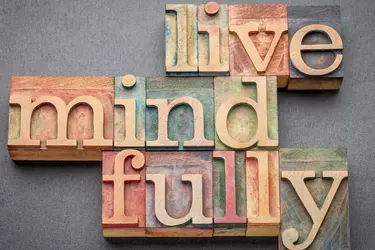- AdventHealth

Hurricane after a disastrous hurricane. Earthquakes. Political conflict. Turmoil around the world.
Some days, bad news seems to be everywhere we look from our phone and TV screens to our social media feeds. All that negativity can feel inescapable, like living in a perpetual cone of uncertainty. It hurts to watch, and yet we can't look away.
Research shows that our attitude toward life can impact our health. Prolonged stress can even speed the progression of certain diseases. We've talked about how to help children cope with stress from hurricane season, but what about you? During times like these, people of every age could use a little help staying positive.
Outlook is the seventh pillar of AdventHealth's CREATION Life model and refers to how we approach the world and our lives. We were all made to be compassionate beings, but even the most happy-go-lucky among us can feel scared, stressed and out of control while constantly facing life's fragility.
We spoke with Dr. Alexander Chriest, education manager for CREATION Life employees at AdventHealth, about how a dose of mindfulness can help you take bad news burnout in stride.
Q: What is mindfulness, exactly?
A: You can look at mindfulness from a number of different perspectives, but for me, its really self-awareness of our mind, body, and spirit. But also, being mindful of your surroundings and the people around you.
Q: How can a person's mental health suffer as a result of being exposed to so much bad news and disaster coverage?
A: It can go a couple of ways. It can increase fear, anxiety and worry, and overwhelm you to the point that its all you're thinking about, all the time. On the other hand, it can also numb us.
My brother just moved to Florida right before Hurricane Irma, and he said, I've never seen a disaster you know about a week in advance. So here we are just waiting, dwelling, thinking of worst-case scenarios. Once you're prepared, you don't need to just worry and worry.
Q: What are some ways we can incorporate mindfulness into our lives?
A: I think reflection is one. Just sitting down and paying attention to the emotions that you're feeling when you experience these things.
But the biggest thing is controlling the controllable in your life. So often we create worry for things we can't control. Worry can be good if it elicits change, but if you dwell on it, it doesn't help. I think that's where mindfulness is.
Also, with everything going on in the world, its always good to get both sides of every story. Mindfulness is getting a complete picture, stepping back and assessing the situation. Then you can address it and be proactive instead of reactive.
Q: How can mindfulness be something positive for kids and teens?
A: When you look at trends in our society, technology just engulfs us for kids and teens, but adults aren't immune to it, either. It's easy to say things that can be hurtful or deceitful over text or on social media; sometimes you forget there's someone on the other side of that text bubble.
Also, when you have children looking to you in stressful situations, it's important to be mindful of how your actions can increase or decrease their stress. If you're running around with panic and worry, what's that going to do to them? Even if that wasn't your intention, its the perception that matters.
Q: What role can faith play in easing stress?
A: Every person's faith means something different to them, but I think faith has a strong connection to the worry component letting go of that worry, and just trusting that there's someone watching over us.
Learn more about CREATION Life



